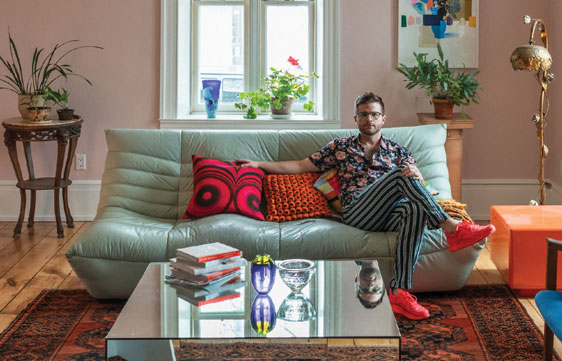
Inspired by the history and the landscape that shaped his childhood, Alex Fida is fuelling a new generation of creativity and entrepreneurship in Prince Edward County.
ALEXANDRE FIDA IS A BIT OF A CELEBRITY IN PRINCE EDWARD COUNTY. His name comes up often in conversations about restoring heritage buildings – from facelifts to full-on rescues and resuscitations. He can haul a historic house back from the very brink. It may take a few years, but he’s quick to comment, “If I am rich in anything, it’s time.” He has also appeared on The Globe and Mail’s Top 10 list of best dressed men in 2017, but mention that and you’ll make him blush. He insists he was just in the right place at the right time, when the County was becoming the darling of the lifestyle pages. “Obviously I peaked early,” he laughs, saying his sartorial splendour has slipped. Working up ladders and down holes, hammering, painting, juggling blueprints and bills while running a 14-room hotel will do that to a guy.
Alexandre was born in Switzerland and grew up in Bloomfield, in a beautiful house built in the Italianate style favoured by barley barons in the 1800s. His father, the late chef Willie Fida, established Angeline’s Inn and Restaurant and is widely regarded as bringing fine dining to the County. Alex and his sister Melanie grew up playing in the halls and common rooms, cheerfully sharing their home with the public. He still does that today in his own historic house in Picton. When Alex bought Falconer House, a whimsical old place with a fairy-tale look, it had long since lost its lavish gardens, not to a thorny forest as in fairytales, but to boring business buildings, plazas and parking lots. Although the same size as when antiques dealer Thera Falconer lived there surrounded by her treasures, it seemed shrunken and sad and destined for the wrecking ball, in spite of, or perhaps because of, its prime location. It had been sitting empty and unsold since Thera’s death in 2008. Everyone wondered what would become of it; nobody was brave enough to take it on.
A collective sigh of relief was heard when Alex Fida bought it. Surely now the House of Falconer would survive. Thera Falconer’s heirs liked his visions and plans for the old place. “The Minaker family made this project possible by giving it to me at a price I could afford,” he says. “There is no way on earth I could have done it without them.”
CHILD IS FATHER TO THE MAN
As a little boy, Alex practiced his reading with a thick history book called The Settlers’ Dream. Published in 1984 by Tom Cruickshank – a name familiar to Watershed readers – historian and architect, Peter Stokes and photographer, John de Visser, it documents the region’s built heritage and is crammed with photos and stories about the surviving beauties of Prince Edward County – and the ones that fell down, burned down or were torn down, too. Perhaps his passion for architecture was sparked by that hefty picture book, the way a passion for trees and tractors is in other kids. “As a child I checked the newspapers for auction sales,” he recalls. “My mother would drive me to the place, leave me and come back for me at the end of the day. I’d look at everything and relish the action and bid on things, too.” He also remembers sitting in the back of his parents’ station wagon on Sunday drives around back roads, seeking out and discovering old forgotten places. “It felt like an epic adventure every time,” he says.
Willie and Monika Fida made Angeline’s a success. “They worked hard and made it pay, but nobody got rich,” he says. Tragedy struck in 2007 when Willie Fida died in a car accident. Alex and Melanie, aged 20 and 17, inherited the inn and restaurant and had to decide what to do. With guidance from Monika, they chose to become second-generation innkeepers. Having grown up in the business, they knew how it ran, and they had ideas for improving accommodations and adding capacity, starting with building a row of motel-style suites and kitting each one out with a distinctive theme and a lot of style.
Before taking on the running of the hotel, Alexandre went to study interior design in Florence, Italy, but came home to finish his degree with honours at Ryerson. It’s a lucky designer who has his own hotel to work on, and he threw himself into it, tapping his talent for reusing, recycling and repurposing, “pulling inspiration,” he says, “from the finest thrift stores and yard sales the world has to offer!” He insists Melanie is the brains of the business. She was just finishing high school when her life changed drastically: she now helps run the hotel, works as a nurse, has two children and is a trained Doula. It’s not uncommon for County people to have two, even three jobs. Some do it to make ends meet, others can’t resist an interesting opportunity. Chris and Norah Rogers come to mind, fellow innkeepers at the Waring House who also run a medical practice and a veterinarian clinic.
THE AGE OF RESTORATION
Alex’s first rescue of a seriously decrepit structure was a log cabin he found, sad and sorry-looking, on a property for sale on Babylon Road. Not a thing of beauty, it would surely be demolished by new owners, so, with help from heritage building expert Kip Brisley, Alex bought it and took it home. He was sure there was something good under all the siding and grime. “We stripped it all back, took it apart, catalogued every piece and reassembled it back at Angeline’s.” Sure enough, beneath four layers of siding that spanned a century there lurked a sturdy original log cabin. They rebuilt it and turned it into a luxurious standalone suite in the hotel gardens. They call it The Babylon. “Built heritage in Canada is often undervalued,” he says. “It’s not as old as in Europe, so people don’t feel it’s as important, but old clapboard farmhouses speak volumes about the settlers and conditions they lived in. I’ve learned through trial and error and working with experts, but the log cabin was my first stepping stone. I figured if a pioneer could do it, I could do it.”
With the Babylon under his belt, Alex was ready for House of Falconer. To help pay for restoration, he opened up the beautiful but desperately in need of renovation rooms to artists and pop-up shops. “It’s about evaluating where your values lie. For me, House of Falconer has not been about money,” he says. “I wanted to provide space for a creative community that I can be a part of, so that I can give others the kind of opportunities I got from County artists when I was growing up.” Peta Hall, a diminutive whirlwind arts activist now, but an internationally known potter in her day, was influential in Alex and Melanie’s young lives. “Mum sent us for pottery classes with her once a week, and we took quilting lessons with Lynn Lusk down the road. Our mother liked us to be busy,” he says wryly. “We did glass blowing with Ian Forbes out at West Lake. We were lucky that way, not just for the lessons and skills but getting to know the artists, being allowed into their world and seeing their creativity and different lives.”
“A lot of sweat equity went into everything my mother and father did and that goes for me, too,” he says. “My partner Adam and I are very resourceful; we’re always picking up new skills. We try our hands at most things, and we’re really good painters now! It’s not like we have a crack team who can bang stuff out in six weeks. We just keep at it, one room at a time as we can afford it.”
HOW DOES IT FEEL TO BE A CELEBRITY?
I can’t help teasing Alex about being a local celebrity. He waves away the idea. I ask if he’s Googled himself lately and he laughs out loud, “Not for some time!” I say I have and I found a lot about him. That sort of kills his smile. He stares out the window as if he’d rather be outside than in an interview. I persist, suggesting he’s like a poster boy for valuing and preserving local heritage, that people admire him and are grateful for his efforts. He sighs and decides to humour me. “I’m really very shy,” he says. “Attention makes me a little uncomfortable. It’s nice that people recognize what I do, but I wish there was more recognition for some of the people that I admire, some of the old-timers. They don’t get the praise they deserve, yet they made this area what it is, they created the foundation of the County. Without them, our strong sense of community would not exist. Then there’s people like Owen who’s out there every day cleaning the streets.” He’s referring to the wiry, silent fellow, a familiar sight in Picton, who speaks to no-one but is out in all weather, picking up litter, sweeping sidewalks, even shoveling snow, totally independent of any local authorities. “Owen is like a celebrity to me,” says Alex. “I admire Geraldine Rorabeck who runs the Fabric World shop on Main Street, she’s just very specialized, content to provide that service and she’s been doing it for decades. I admire the tight multi-generation families here, too, and the sense of community they cultivate.”
At that point, Adam enters the room with a large glass of something green and healthy for Alex. I’m grateful for his candour and decide I won’t press him any more.
Like Alex, the House of Falconer has worn many hats. In the three years since it opened its doors, the old home has already been used as accommodation, a pop-up retail space, an arts space, and it has provided a shady garden for the public to enjoy. Alex shares the story of the House of Falconer’s renovation and evolution in posts and pictures on social media.
Today, we are sitting in a big, graceful room with soaring original windows, a handsome Victorian fireplace and classy mid-century furnishings. The last time I was in this room, it held a vintage clothing mini shop. During Falconer’s Christmas Market, it housed Sparkbox artists Chrissy Poitras and Kyle Topping who were making jolly original artworks on the spot. For now, it’s just a sitting room, part of the vacation rental space that will help pay the bills this summer. As Alex sips his restorative drink, I appreciate how bright and welcoming it is while still being filled with a palpable sense of history. Looking up, I see an astonishing light fixture, so unusual and lovely I nearly fall backwards. “It’s by Harlan House,” Alex says. “Do you know his stuff?” I do. He’s an acclaimed and inventive porcelain artist. “It’s pretty old,” he says. “My mum bought it years and years ago. Looks good in here, doesn’t it?”
Alex and Adam’s quarters are in the rebuilt drive shed, perhaps the worst part of the property when they bought it. The whole community watched the progress of its restoration, gasping as it was taken down and cheering as it went back up. As with the log cabin, they dismantled it carefully, numbered every piece, and rebuilt it using the original materials supplemented by necessary new bits. The day the walls went up again felt like an old-style barn-raising in downtown Picton. Willing friends and volunteers pushed and pulled together to raise the structure. Alex took down fences, and opened up the house to the town again. He’s content to have people strolling the garden path; in fact he put it in to be a shady shortcut from the plaza car park to the Second Time Around shop. “It’s dangerous being so close to the secondhand shop,” he grins. “I try to stay away.” Unlike his long-term tenant, the brilliant artist Jonathan Kaiser, who lives and works at Falconer House and goes to the shop every chance he gets.
WHERE TO NOW?
“I am always looking for the next thing,” says Alex. “But right now I just want to do what I’m doing well and not overextend myself. I’m very happy with what I have, and I want to help other people now so I do some consulting. Friends have bought an 1840s Quaker house in Bloomfield, opposite Angeline’s, that needs a lot of work. The foundation has gone but they really want to save it, and I can help. I do some interior design work, and of course I just try to stay on top of maintenance at Angeline’s. Melanie and I are thinking about the next chapter there, making strategic plans for the coming years. There are so many moving parts! When our last chefs left the restaurant to start their own place, we took the chance to re-evaluate and figure out where to go with it and came up with the Supper Club, inviting different chefs to do pop-up dinners through the year.”
It’s not been an easy ride, but Alex is one of those fellows who would never tell you about the difficult times. He just feels lucky. “I’m fortunate to be able to build a life for myself here and do what I love. The County is my home. I know life is changing here, but then I don’t think Falconer House could have worked 10 years ago. It’s a combo of private/ public space with pop-ups and artist studios, events and rentals and our home.” We talk a bit about the drawbacks to rapid change in an old community, but Alex truly feels every single person who is in the County is part of the community, it’s why people want to be here. “My goal has always been to welcome anyone and everyone who is interested in what I have to offer,” he says simply. “If they want to be a part of it, that’s great; if they’re just curious, they’re welcome. As soon as you create walls, if you say, ‘Oh, you’re welcome. You can be part of it, but you can’t’, you run into problems. It’s that us-versus- them thing.”
He’s a young man who feels connected to the past, the long-ago and not-so-long-ago, and is enthused about the future. “Melanie stops by with her children a lot,” he says. “We love being uncles, and Jonathan has become a big part of everybody’s life too. I wonder how the children will feel about House of Falconer and the people who come and go here as they grow up, how their memories will compare to our memories of Angeline’s.” Alex Fida is doing his best to preserve the County’s built heritage so it will be more than just memories. And to many of us that makes him a bit of a celebrity.
Story by:
Janet Davies
Photography by:
Johnny C. Y. Lam

